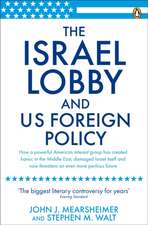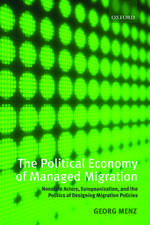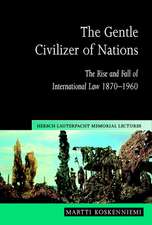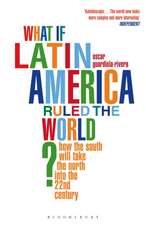The Politics of International Law
Autor Martti Koskenniemien Limba Engleză Paperback – 9 iun 2011
Preț: 409.21 lei
Preț vechi: 562.72 lei
-27% Nou
Puncte Express: 614
Preț estimativ în valută:
78.30€ • 83.73$ • 65.29£
78.30€ • 83.73$ • 65.29£
Carte tipărită la comandă
Livrare economică 17 aprilie-01 mai
Preluare comenzi: 021 569.72.76
Specificații
ISBN-13: 9781841139395
ISBN-10: 1841139394
Pagini: 388
Ilustrații: black & white illustrations
Dimensiuni: 156 x 234 x 23 mm
Greutate: 0.61 kg
Editura: Bloomsbury Publishing
Colecția Hart Publishing
Locul publicării:London, United Kingdom
ISBN-10: 1841139394
Pagini: 388
Ilustrații: black & white illustrations
Dimensiuni: 156 x 234 x 23 mm
Greutate: 0.61 kg
Editura: Bloomsbury Publishing
Colecția Hart Publishing
Locul publicării:London, United Kingdom
Caracteristici
Written by a well-known practitioner and theorist of international law.Covers an important, contemporary subject.Examines and reflects on recent debates on humanitarian intervention, collective scrutiny and protection of human rights.
Notă biografică
Martti Koskenniemi is Professor of International Law at the University of Helsinki, Hauser Global Visiting Professor of Law at New York University and Director of the Erik Castren Institute of International Law and Human Rights.
Cuprins
Koskenniemi: A Critical Introduction by Emmanuelle Jouannet Part I: The Politics of International Law 1. Between Apology to Utopia: The Politics of International Law 2. The Politics of International Law - 20 Years Later Part II: The Law and Politics of Collective Security 3. The Place of Law in Collective Security 4. 'The Lady Doth Protest Too Much': Kosovo, and the Turn to Ethics in International Law Part III: The Politics of Human Rights 5. The Effect of Rights on Political Culture 6. Human Rights, Politics and Love Part IV: Limits and Possibilities of International Law 7. Between Impunity and Show Trials 8. Faith, Identity, and the Killing of the Innocent: International Lawyers and Nuclear Weapons9. International Law and Hegemony: a Reconfiguration 10. What is International Law For? Part V: The Spirit of International Law 11. Between Commitment and Cynicism: Outline for a Theory of International Law as Practice 12. Style as Method: Letter to the Editors of the Symposium 13. Miserable Comforters: International Relations as New Natural Law14. The Fate of Public International Law: Between Technique and Politics
Recenzii
The book's reflection upon the approaches, styles, and methods of this age and the past in the field of international law is both powerful and provocative, and the synthetic messages emanating from the myriad of strains of thought are of great force of persuasion. Its intensity in analysis and critique is remarkable, and the author does not mince his words. Given the book's distinct narrative style and the number of references to literature, it should be a recommended reading for postgraduate students and scholars in international law and international relations alike. The author's experience may be quite singular, but the viewpoint he possesses and reveals in the book is helpful to any that aspires to study and work in this field.
Descriere
These essays examine political and humanitarian intervention, collective security, protection of human rights and the 'fight against impunity'.














